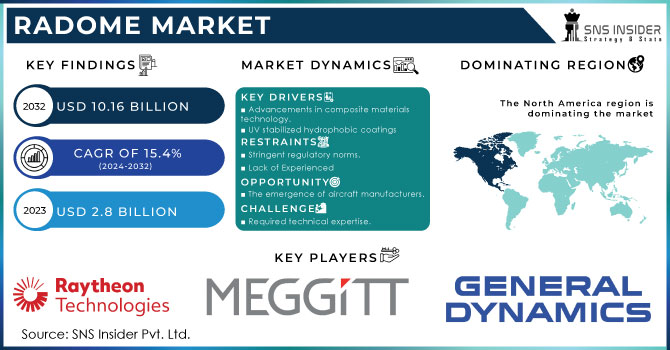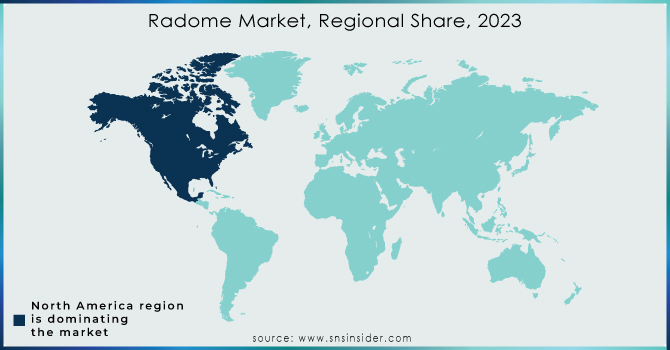Radome Market Report Scope & Overview:

To get more information on Radome Market - Request Free Sample Report
The Radome Market Size was valued at USD 2.8 billion in 2023 and is expected to reach USD 10.16 billion by 2032, with a growing CAGR of 15.4% over the forecast period 2024-2032.
A radome is a structure used to shield an aircraft's radar equipment. The radome is made of materials that reduce the strength of the electromagnetic signal sent or received by the antenna. Radome shields the antenna from inclement weather. Furthermore, the use of a radome increases system performance by preventing the antenna from coming into direct contact with wind, rain, or ice.
Radomes come in a variety of forms and sizes, depending on the design of the aircraft and its use. Depending on the purpose, radomes are made of fiber or core materials. Manufacturers have recently focused on creating lightweight and robust airplane radomes that can transfer signals effortlessly.
MARKET DYNAMICS
KEY DRIVERS
-
Advancements in composite materials technology.
-
UV stabilized hydrophobic coatings
-
High reliability.
RESTRAINTS
-
Stringent regulatory norms.
-
Lack of Experienced
-
Safety regulations
-
Strict quality checks
OPPORTUNITIES
-
The emergence of aircraft manufacturers.
-
New aircraft manufacturing companies in regions.
-
The rise in demand for aircraft.
CHALLENGES
-
Difficulties in maintenance and repair.
-
Required technical expertise.
-
Need for proper tools and simulation processes.
-
Communication Antenna.
IMPACT OF COVID-19
Due to Covid-19 lockdown restrictions in several countries throughout the world, businesses are having problems physically visiting their channel partners and closing business transactions. As a result, the firms' Platform sales are being harmed. Furthermore, factors such as the closure of beauty retail locations and cosmetic firms, as well as a scarcity of raw material supply due to stringent limitations, may drastically slow the rate of Platform consumption among the worldwide population.
KEY MARKET SEGMENTATION
By Offering
-
Body
-
Accessories
-
Services
By Platform
-
Airborne
-
Ground
-
Naval
By Application
-
Radar
-
Sonar
-
Communication Antenna
By Frequency
-
HF/UHF/VHF-Band
-
L-Band
-
S-Band
-
C-Band
-
X-Band
-
KU-Band
-
KA-Band
-
Multi-Band
REGIONAL ANALYSIS
North America, Latin America, Europe, Asia Pacific, the Middle East, and Africa are the five regions that make up the Global Radome Market. Significant expenditures by major players in R&D efforts for the development of enhanced radome solutions, as well as increased demand for sophisticated radome systems, are expected to fuel the growth of the radome market in this region. The United States is expected to lead the growth of the North American radome market during the projected period.

Need any customization research on Radome Market - Enquiry Now
REGIONAL COVERAGE
North America
-
USA
-
Canada
-
Mexico
Europe
-
Germany
-
UK
-
France
-
Italy
-
Spain
-
The Netherlands
-
Rest of Europe
Asia-Pacific
-
Japan
-
South Korea
-
China
-
India
-
Australia
-
Rest of Asia-Pacific
The Middle East & Africa
-
Israel
-
UAE
-
South Africa
-
Rest of the Middle East & Africa
Latin America
-
Brazil
-
Argentina
-
Rest of Latin America
KEY PLAYER
The Key Players are General Dynamics, Raytheon, Saint-Gobain, Infinite Technologies, Cobham (Meggitt), Nordam, L-3 ESSCO, Kelvin Hughes, Royal Engineered Composites, Leonardo & Other Players.
| Report Attributes | Details |
|---|---|
| Market Size in 2023 | USD 2.8 Billion |
| Market Size by 2032 | USD 10.16 Billion |
| CAGR | CAGR of 15.4% From 2024 to 2032 |
| Base Year | 2023 |
| Forecast Period | 2024-2032 |
| Historical Data | 2020-2022 |
| Report Scope & Coverage | Market Size, Segments Analysis, Competitive Landscape, Regional Analysis, DROC & SWOT Analysis, Forecast Outlook |
| Key Segments | • By Platform (Ground, Airborne, Naval) • By Application (Radar, Sonar, Communication Antenna) • By Frequency (HF/UHF/VHF Band, L- Band, S-Band, C- Band, X- Band, KU- Band, KA- Band, Multi-Band) • By Offering |
| Regional Analysis/Coverage | North America (USA, Canada, Mexico), Europe (Germany, UK, France, Italy, Spain, Netherlands, Rest of Europe), Asia-Pacific (Japan, South Korea, China, India, Australia, Rest of Asia-Pacific), The Middle East & Africa (Israel, UAE, South Africa, Rest of Middle East & Africa), Latin America (Brazil, Argentina, Rest of Latin America) |
| Company Profiles | General Dynamics, Raytheon, Saint-Gobain, Infinite Technologies, Cobham (Meggitt), Nordam, L-3 ESSCO, Kelvin Hughes, Royal Engineered Composites, Leonardo |
| DRIVERS | • Advancements in composite materials technology. • UV stabilized hydrophobic coatings • High reliability. |
| RESTRAINTS | • Stringent regulatory norms. • Lack of Experienced • Safety regulations |

